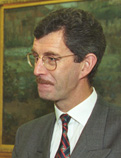Dick Spring
Richard "Dick" Spring ( Irish : Risteard Mac An Earraigh ; born August 29, 1950 in Tralee , County Kerry ) is an Irish politician with the Irish Labor Party .
Professional and sporting career
After studying law at the King's Inn, he worked as a barrister for some time . Today Spring is the international legal advisor to a law firm in Washington, DC and a board member of a communications company.
He was also a rugby player with Munster Rugby and London Irish in the 1970s . In 1979 he was a member of the Irish national rugby union team .
Political career
MP
Spring began his political career in 1981 with the election to the House of Commons ( Dáil Éireann ). There he represented the interests of the Irish Labor Party of the constituency of Kerry North until 2002 . In this constituency he succeeded his father Dan Spring, who had been an MP since 1943. At the same time he was in the coalition government of the Fine Gael and Labor Party under Prime Minister Garret FitzGerald from June 30, 1981 to March 9, 1982 Minister of State with special responsibility for judicial reform.
Labor Party leader and majority fundraiser
As early as 1982 Spring was chairman of the Labor Party and in December formed a coalition government together with Fine Gael. In Garret FitzGerald's cabinet he was Deputy Prime Minister ( Tánaiste ) and initially Environment Minister (1982 to 1983) and later Minister of Energy (1983 to 1987). In this function he was Chairman of the Council of Energy Ministers of the European Communities (EC) in 1984 . On January 20, 1987, however, the Labor Party left the coalition government because of the budget crisis. In the subsequent election to the House of Commons, the Fine Gael was defeated by Fianna Fáil , and Spring himself was only just four votes ahead of him.
In the parliamentary election of 1992, the Labor Party more than doubled its seats from 15 to 33. In January 1993 the Labor Party formed a coalition government with Fianna Fáil, and Prime Minister Albert Reynolds reappointed Spring as Tánaiste and Irish Foreign Minister . After a disagreement with Reynolds over the nomination for President of the Supreme Court, Spring left the coalition government with his Labor Party in November 1994.
Without a new parliamentary election, the Labor Party formed a coalition government with the Fine Gael and the Democratic Left . The new Prime Minister, John Bruton , appointed Spring as Deputy Prime Minister and Secretary of State in December 1994. In this capacity he was also President of the Council of the European Union in the second half of 1996 .
During his tenure as foreign minister, Spring was involved in several negotiations to resolve the Northern Ireland conflict. On December 15, 1993, he accompanied Prime Minister Reynolds to sign the Downing Street Declaration with British Prime Minister John Major . In addition, he was Vice-Chairman of the Irish-British Intergovernmental Conferences from 1993 to 1997. Finally, he headed the Irish delegation to negotiate the Good Friday Agreement , which was not signed until April 15, 1998.
Resignation as party chairman and loss of the parliamentary seat
In the parliamentary elections on June 26, 1997, the Labor Party lost almost half of the 33 seats it had won five years earlier and was represented in parliament by only 17 members ( Teachta Dála ). After the candidate of the Labor Party won only fourth place out of five candidates in the 1997 presidential election, Spring resigned as chairman of the Labor Party.
In the 2002 parliamentary elections, Spring finally lost his mandate in the Dáil Éireann against the constituency candidate of the Sinn Féin .
Biographical sources and background information
| personal data | |
|---|---|
| SURNAME | Jump, Dick |
| ALTERNATIVE NAMES | Risteard Mac An Earraigh; Spring, Richard |
| BRIEF DESCRIPTION | Irish politician, minister, lawyer, sportsman |
| DATE OF BIRTH | August 29, 1950 |
| PLACE OF BIRTH | Tralee |

